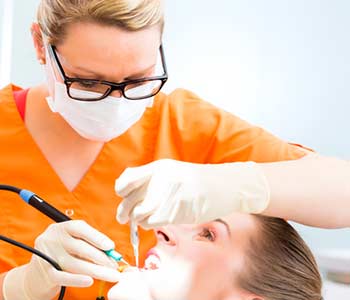Latest research sheds light on how gum disease could lead to Alzheimer’s

Alzheimer’s disease is a devastating brain disease and its prevalence is rapidly growing in the United States. Approximately 5.7 million Americans are diagnosed with the Alzheimer’s disease, which is a degenerative condition that causes progressively worsening dementia. Alzheimer’s disease not only dramatically affects the lives of the people living with the condition, but also their families and caregivers. Research has been underway for many years to determine the cause of Alzheimer’s and how to treat it, but the latest scientific findings implicate an extremely common condition in the development of Alzheimer’s: gum disease.
Evidence that Alzheimer’s may be caused by gum disease-causing bacteria
Results from a recent study, published in the journal Science Advances, demonstrate the linkage between gum disease and Alzheimer’s disease. In the study, the researchers studied the brains of Alzheimer’s disease patients and found a high prevalence of Porphyromonas gingivalis, the most common pathogen in periodontal disease.
The scientists theorize that the Porphyromonas gingivalis bacteria create enzymes called “gingipains” that colonize the brain and cause inflammation that damages or destroys brain tissue. These damaging gingipains were found in over 90% of the brains studied, as well as in the patients’ cerebrospinal fluid. The harmful Porphyromonas gingivalis bacteria have also been implicated in other serious chronic diseases, such as cardiovascular disease, so it is important to minimize the bacteria circulating in your body for multiple health reasons.
Reducing the harmful disease-causing bacteria in your gums and brain
Armed with the knowledge that the Porphyromonas gingivalis may be involved in the development of Alzheimer’s disease, researchers are investigating the best treatment options to target and destroy these harmful bacteria and gingipains before they can damage brain tissue. But studies of these medications are still at the early stages and have been primarily done in mice, so approved treatments for humans are likely years away from being available for use.
As a result, to reduce your chances of developing Alzheimer’s disease due to gum disease, one of the most effective things you can do right now is to see your dentist. Gum disease is extremely common in the United States and it is estimated that half of American adults have some form of it. Your dentist can determine whether you have gum disease and if you do, it is important follow their advice on how treat it.
Diagnosing gum disease and getting the right treatment
Dr. Kovtun can determine the health of your gums in a comprehensive exam and recommend the appropriate treatment needed for your unique oral health needs.
In some cases, mild cases of gum disease can be resolved with a daily home care regimen and regular dental hygiene visits. In other more advanced cases, the dentist may recommend one or more treatments that need to be done in the dental office, or you may be prescribed medications such as oral antibiotics or topical antibiotic gels to reduce the bacterial infection.
You can be assured that the treatments that Dr. Kovtun suggests are tailored to your specific needs and that only the treatments that are actually important for improving your oral health will be recommended. Periodontal disease procedures that Dr. Kovtun may recommend include:
- Deep cleaning of your gums with scaling and root planing: In this non-surgical procedure, the dentist removes the built-up plaque between your gums and teeth that is causing inflammation in your gums and harboring the harmful bacteria. The dentist uses hand tools or an ultrasonic device to remove the plaque and the tissues may be irrigated and cleaned with an antibacterial wash. Root planing is then used to smooth out the roots of your teeth so that your gums can properly re-attach to them.
- Periodontal surgery: In some cases, gum surgery may be needed to treat your gum disease and help your gums and teeth heal. One or more surgical techniques, such as flap surgery, bone grafts, tissue grafts, and guided tissue regeneration, may be used depending on your specific needs. After a successful gum surgery, your damaged bones and tissues will have the chance to regrow, the potential for tooth loss due to gum disease will be diminished, and the harmful bacteria will be greatly reduced.
After the health of your gums is restored, it is important to maintain your periodontal health with the following home care techniques:
- Brush your teeth after every meal, or at least two times per day, with a high quality toothpaste.
- Floss between your teeth at least one time per day to remove any plaque or food debris that brushing alone can’t get.
- Rinse with antibacterial mouthwashes that reduce any remaining bacteria on your teeth and gums.
- See Dr. Kovtun at least twice a year for a professional cleaning and check-up.
Take the steps today to protect your brain in the future
It is important to follow the guidelines that your dentist gives you to reduce the chances of the bacteria spreading throughout your body and brain. Gum disease will not go away on its own. But, with the appropriate treatments in the dental office and good home care for your teeth and gums, gum disease can become a thing of the past and the harmful Alzheimer’s disease-causing bacteria circulating through your body will be diminished.
Dr. Kovtun and the team at Alpha Plus Dental Center care not only about the health of your mouth, but your overall health and well-being. Protect your future brain health by taking care of your mouth and treating your gum disease today!










